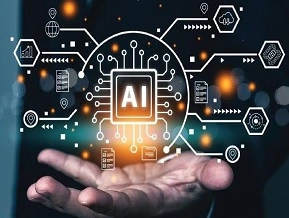How to Learn Artificial Intelligence from Scratch – A Complete Beginner’s Guide
In 2025, how to learn AI has become one of the most frequently asked questions by students, working professionals, and lifelong learners alike. With Artificial Intelligence (AI) playing a pivotal role in industries ranging from business and healthcare to education, logistics, and marketing, acquiring AI skills is now considered a smart investment for the future. As the technology evolves, so does the need for people across all domains to understand, apply, and innovate using AI.
The good news is- you no longer need a degree in computer science or years of coding experience to start learning AI. The learning landscape has evolved to become more inclusive and accessible. Today, with beginner-friendly courses, interactive tools, and real-world projects, how can I learn AI is a question that has a clearer, more achievable answer than ever before.
Why is AI for Everyone
Artificial Intelligence is no longer the exclusive domain of software engineers and data scientists. AI is becoming a foundational skill, much like digital literacy or basic math. From automating repetitive tasks to making data-driven decisions, AI tools are being integrated into day-to-day operations in roles across finance, healthcare, human resources, sales, and customer service.
Understanding how to learn AI is no longer optional—it’s an essential step for staying relevant in the modern workforce. Whether you're looking to boost your resume, shift into a tech role, or simply want to understand the tools shaping our world, starting with the right mindset and learning strategy is key.
Step 1: Understand What AI Really Is
Before jumping into code or theory, take time to grasp the fundamentals. What is AI? What are the types—like machine learning, deep learning, and natural language processing? Why is it being used so widely? These foundational questions help you form a mental model that makes further learning easier and more meaningful.
You’ll discover that many AI systems mimic human thinking, but are powered by algorithms and large datasets. Understanding how AI models are trained and evaluated is the first step in learning how do I learn AI in a structured, sustainable way.
Step 2: Choose Beginner-Friendly Learning Resources
Thanks to the growing popularity of AI education, there are now hundreds of online courses, tutorials, and books that explain AI in simple terms. Look for courses specifically designed for beginners. These often use visual aids, no-code tools, and interactive labs to help demystify core concepts.
Some great starting points include:
- Introductory AI courses on platforms like Coursera, Udemy, or edX
- YouTube channels that break down machine learning basics
- Interactive platforms like Google’s Teachable Machine or Microsoft Learn AI
Asking how can I learn AI is often followed by the next challenge: staying motivated. That’s where structured learning and incremental progress can really help.
Step 3: Start Building—No Code Needed
Once you understand the concepts, apply them with hands-on practice. Many modern AI platforms allow you to experiment without writing a single line of code. Tools like RunwayML, Lobe.ai, and ChatGPT offer ways to create AI models, analyze data, or generate content using AI—all through intuitive interfaces.
Learning how do I learn AI becomes much easier when theory is paired with practice. Completing projects like building an image classifier, a chatbot, or a simple data analysis dashboard will give you both confidence and portfolio material.
Step 4: Explore Certifications and Career Paths
To take your skills further, consider pursuing industry-recognized certifications. These often include structured paths with quizzes, final projects, and credentials you can add to your resume or LinkedIn profile. They also help you prepare for specialized roles such as:
- AI Product Manager
- Data Analyst
- Machine Learning Engineer
- AI Consultant
You’ll not only learn technical skills but also how to communicate AI solutions, analyze ethical implications, and solve real-world problems.
Start now: Browse Beginner AI Courses
What is Artificial Intelligence?
Artificial Intelligence refers to the ability of machines and software systems to perform tasks typically requiring human intelligence. These tasks include recognizing speech, translating languages, analysing data, making predictions, and even simulating conversation. In short, AI mimics human cognition and decision-making using logic, data, and algorithms.
AI is composed of several key subfields:
- Machine Learning (ML) – The foundation of most modern AI, where models learn patterns from data.
- Deep Learning – A specialized form of ML that uses layered neural networks for more complex tasks like image recognition and language translation.
- Natural Language Processing (NLP) – Enables machines to understand, interpret, and generate human language.
- Computer Vision – Allows AI systems to interpret and respond to visual inputs like photos or videos.
Whether you’re building chatbots, improving customer experiences, or enhancing product recommendations, these subfields play a major role in how AI is used in real life.
Learn the basics: What is Artificial Intelligence?
Why Learn AI in 2025?
Learning AI in 2025 is no longer optional, it’s an essential career skill. As the adoption of artificial intelligence accelerates across every sector, millions of new roles are being created that require AI literacy. Businesses are not only hiring AI specialists but also expecting general employees to understand how to interact with AI tools in their daily workflows.
Some of the most in-demand AI-related job roles include:
- AI Engineer
- Machine Learning Specialist
- Data Analyst
- AI Product Manager
- AI Researcher
- Prompt Engineer
These roles span diverse industries like healthcare, fintech, logistics, marketing, and education—proof that AI isn’t just for tech companies anymore. Even non-technical roles now benefit from AI tools that assist with data analysis, automation, content creation, and customer engagement.
Understanding how AI works empowers you to:
- Stay ahead in a rapidly evolving job market
- Contribute meaningfully to AI-driven projects in your field
- Position yourself for promotions, leadership roles, or career shifts
Explore in-demand jobs: Careers in Artificial Intelligence
How to Get Started: Step-by-Step Guide for Beginners
1. Understand the Basics
Begin with foundational AI concepts—what AI is, how it works, and how it differs from related technologies like automation or analytics. Learn about the three major types of learning: supervised learning, unsupervised learning, and reinforcement learning.
Start with: AI Fundamentals for Beginners
2. Take Introductory AI Courses
Enrol in beginner-friendly AI courses that break down key topics into simple, interactive lessons. Focus on:
- Introduction to AI & Machine Learning
- AI for Non-Tech Professionals
- AI in Healthcare or Business
Browse full list: AI Courses & Certification Programs
3. Practice with AI Tools
Hands-on experience is crucial. Use no-code AI platforms like:
- ChatGPT – Generate text, simulate conversations, and brainstorm ideas
- Google Teachable Machine – Train your own image/audio classifier without code
- DALL·E – Create AI-generated images from text prompts
- ScratchML – Learn visual AI programming interactively
Try tools here: AI Tools for Daily Use – No Coding Required
4. Work on Mini Projects
Apply your skills through small projects such as:
- Building a simple AI chatbot
- Creating a fake news detection model
- Designing an image classifier using pre-trained models
Find inspiration: Beginner AI Projects
5. Earn Recognized Certifications
Boost your credibility with AI certification courses that validate your expertise:
- AI and Cybersecurity
- AI in Accounting
- AI and Digital Marketing
Learn more: All AI Certificate Courses
Explore Future Career Paths in AI
Once you’re comfortable with the basics, consider pursuing a specialization. AI skills can be applied across many fields. Explore dedicated tracks such as:
- AI in Business & Management – Strategic automation, AI analytics, and operations
- AI in Education – Personalized learning, virtual tutors, academic insights
- AI for Healthcare – Patient monitoring, diagnostics, treatment planning
- AI in Project Management – Automated scheduling, risk analysis, task prioritization
- AI in Supply Chain – Real-time logistics, demand forecasting, warehouse AI
Discover more: AI Career Pathways
Free Resources to Keep Learning AI
Keep your learning momentum going with our curated library of free AI learning resources:
- AI Glossaries – Simple definitions of technical terms
- Learning Roadmaps – Visual plans to guide your AI journey
- Project Templates – Downloadable blueprints to start building
- Tutorial Videos – Short lessons on tools like ChatGPT and DALL·E
Access all resources: AI Resources
Want to Go Deeper? Read These Blogs
Our expert-written blog section helps learners at all levels gain insights and stay motivated. Popular reads include:
- AI in Daily Life – Getting Comfortable with AI
- Top AI Skills to Learn in 2025
- AI for Non-Tech Professionals: Where to Begin?
Visit blog: AI for Everyone Blog
Final Thoughts
Learning artificial intelligence from scratch is entirely achievable in 2025—even if you have zero technical background. With the right mix of foundational knowledge, user-friendly tools, practical projects, and career-focused courses, you can confidently take your first steps into the world of AI.
At LearnArtificialIntelligence.ai, we’re here to guide you every step of the way. Whether you want to earn a certificate, complete a mini project, or explore AI’s role in your industry, we offer a complete ecosystem designed for beginners.
Ready to begin? Explore Beginner AI Courses Now












